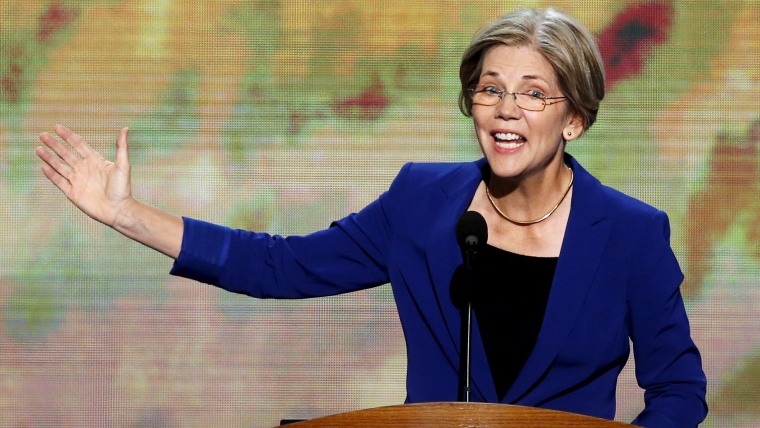Sen. Elizabeth Warren announced Wednesday that she will serve on the Senate Armed Services Committee next year, a sign that the Massachusetts Democrat is looking to broaden her policy portfolio beyond the economic and consumer issues that propelled her political rise.Ms. Warren, a leading figure within of the progressive wing of the Democratic Party who is regularly mentioned as a possible presidential or vice presidential contender, come January will get a spot on the committee, which has primary jurisdiction over defense and military issues, pending approval from her Democratic colleagues and the full Senate.... Her spot on the Armed Services committee will give her a voice in the Senate debates over defense spending, military policy, base closures, and the confirmation of many of President-elect Donald Trump's picks to run the Pentagon.
Elizabeth Warren adds national security to her policy repertoire
Ahead of 2020, Elizabeth Warren will bolster her national security bona fides, but do voters still care about presidential qualifications?

As a presidential candidate eight years ago, Barack Obama made no secret of his interest in Virginia's Tim Kaine as a possible running mate, but the future president saw a hole in his friend's resume: the then-governor, Obama said, needed a stronger background in foreign policy.And so, Kaine did exactly that. The Virginia Democrat ran for the Senate in 2012, and sought out assignments on the Senate Armed Services Committee and Senate Foreign Relations Committee. Soon, he developed a depth of knowledge on these issues that rivals that of anyone in Congress. The combination of Kaine's expertise in domestic and foreign policy earned him a place on his party's national ticket, and he very nearly became vice president.I mention this story because it looks like another high-profile Democratic senator is doing something very similar. The Wall Street Journal reported yesterday:
Time will tell whether Warren runs for president, and it's certainly possible that her new committee assignment isn't related to future ambitions. But it's nevertheless of interest that the Massachusetts senator -- who has already told Rachel on the air that she believes she's ready for the responsibilities of national office -- is following Kaine's example, identifying the policy gap on her political c.v., and taking steps to address it.But stepping back, what's especially interesting about this to me is the fact that Warren, like Kaine, still take concerns like qualifications and credentials seriously in the Age of Trump.Not to put too fine a point on this, but there may be a fundamental difference between how Democrats and Republicans evaluate national candidates. If Warren is thinking about 2020 -- and, again, I have no idea if she is -- it makes sense that she'd want to be able to prove to voters that she's not a one-trick pony. By broadening her areas of expertise, the senator can present herself not only as a champion of consumers against financial-industry excesses, but also as someone capable of serving as Commander in Chief.On the right, it's less clear any of this is a priority. Donald Trump, love him or hate him, ran for president despite having no experience in -- or even rudimentary understanding of -- foreign policy or domestic policy. At times, he seemed confused by the basics of what government does and what the office of the presidency is.The vast majority of Republican voters didn't care -- at all. Indeed, much of the American electorate seemed completely indifferent towards Trump's unnerving incompetence, overlooking his ignorance as unimportant.It's easy to respect Warren's willingness to broaden her policy horizons, but given the results of the 2016 presidential election, it's also hard not to wonder whether we're witnessing a political era in which much of the American mainstream no longer cares whether candidates are qualified for the office or not.